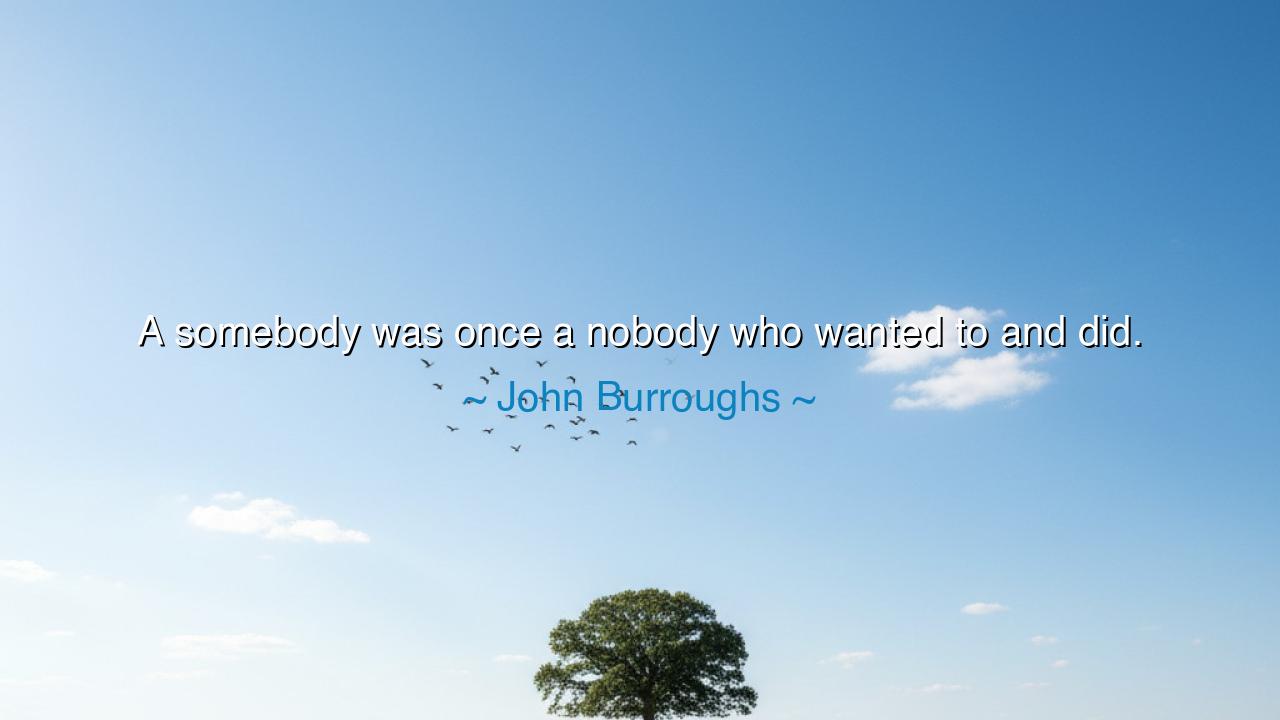
A somebody was once a nobody who wanted to and did.






In the words of John Burroughs, the naturalist and philosopher who studied both the forests of the earth and the inner landscapes of the soul, we hear a teaching as sharp as it is simple: “A somebody was once a nobody who wanted to and did.” This is not only a reflection on ambition, but on the very essence of human becoming. For no man or woman is born into greatness complete. Each soul begins small, obscure, unrecognized. What separates the somebody from the nobody is not fate alone, nor privilege alone, but the burning will to act—the choice to step forward when others remain seated.
The origin of this wisdom lies in the eternal struggle of the human spirit. Every empire, every discovery, every work of art was once nothing more than a desire in the heart of one who seemed insignificant. The nobody who “wanted to” is the dreamer, the one who hungers for more than the life allotted to him. But wanting alone is not enough. How many thousands have wanted and never dared? How many dreamed and never moved? The power lies in the second half of the phrase—“and did.” For action is the bridge that transforms shadow into substance, dream into destiny.
Consider the story of Abraham Lincoln, born in a log cabin, the son of poor farmers, with no advantage but the fire within him. By all accounts, he was a nobody, a boy who split rails for work and read by the dim light of the hearth. Yet he wanted to rise, to learn, to serve. And more importantly, he did—he studied, he spoke, he persevered through failure and loss until he became not only a leader of men but a preserver of nations. In him we see Burroughs’s wisdom embodied: the somebody is simply the nobody who refused to remain still.
The ancients knew this too. Think of Alexander of Macedon, who, as a boy, was seen as just another prince in a small kingdom on the edge of Greece. Yet he wanted to surpass the deeds of his forefathers, and he did, carving his name into history by marching farther than any before him. Likewise, Socrates, once a stonemason, rose from obscurity to become the gadfly of Athens, remembered not for noble birth but for the courage to question all things. Time and again, history proclaims the same law: greatness is not bestowed; it is seized through will and action.
The meaning of Burroughs’s words, then, is a call to reject excuses and passivity. To say, “I am a nobody,” is not to describe a destiny, but only a starting point. The true tragedy is not to begin small, but to end small because one never acted. Every somebody you admire—be it inventor, artist, leader, or saint—once stood where you now stand, unknown, uncertain, ordinary. What changed their fate was not a gift of the gods, but the fire to want and the courage to do.
Let the lesson be this: if you wish to rise, you must first desire, but then you must act. Desire alone is like a bow without an arrow—it looks strong, but it strikes nothing. Action without desire is empty, for it lacks the soul’s fire. But when desire and action join together, they forge destiny. Write your vision, pursue it step by step, and when obstacles come—as they surely will—remember Burroughs’s truth: even the greatest were once as small as you.
Practical counsel is this: choose one goal today that burns within you. Declare it, and take one action toward it, however small. Do not wait for perfection; do not wait for permission. Begin, for every somebody began with a single step. And when doubt whispers that you are a nobody, answer with this truth: every giant was once a child, every victor was once defeated, and every legend was once unknown. What made them different was simply this—they wanted to, and they did.
Thus, Burroughs’s words stand as an eternal teaching for all generations: greatness is not a gift, it is a choice. Do not despise the day of small beginnings, for within it lies the seed of glory. And when the story of your life is told, let it not be said that you only wanted, but that you also did. For in that union of longing and action, the nobody becomes the somebody, and the ordinary becomes immortal.






AAdministratorAdministrator
Welcome, honored guests. Please leave a comment, we will respond soon